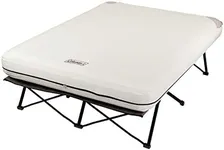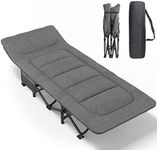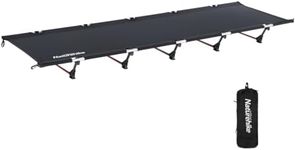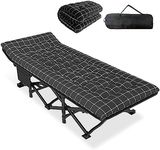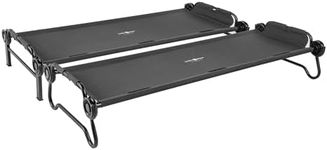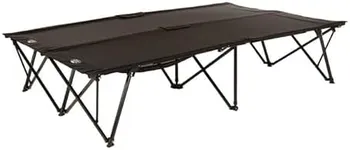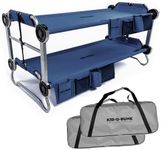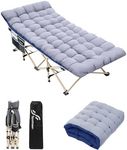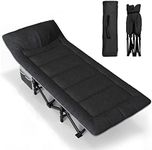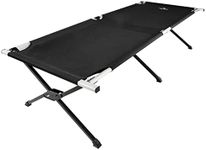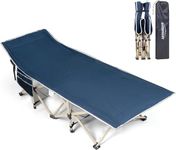Buying Guide for the Best Camping Cot
Choosing the right camping cot can make a big difference in your comfort and quality of sleep while outdoors. A camping cot is essentially a portable, elevated bed designed for use in tents or under the stars. When picking a cot, it's important to consider how you'll use it—whether for backpacking, car camping, or as a guest bed at home. Think about your priorities: do you want something lightweight and compact, or is maximum comfort and support more important? Understanding the key features will help you find a cot that matches your needs and makes your camping experience much more enjoyable.Weight CapacityWeight capacity refers to the maximum amount of weight the cot can safely support. This is important because using a cot beyond its weight limit can lead to discomfort or even damage. Cots typically range from supporting around 200 pounds to over 400 pounds. If you are a lighter person or plan to use the cot for children, a lower weight capacity may be sufficient. For heavier adults or if you want extra durability, look for a cot with a higher weight limit. Always check this spec to ensure the cot will be safe and comfortable for whoever will use it.
Size (Length and Width)The size of a camping cot determines how much sleeping space you have. Standard cots are usually around 75 inches long and 25 inches wide, but there are longer and wider options for taller or larger individuals. If you are tall or like to move around while sleeping, look for a cot with extra length or width. For smaller tents or children, a more compact cot may be a better fit. Consider your body size and how much room you need to sleep comfortably when choosing the right size.
Weight of the CotThe weight of the cot itself affects how easy it is to carry and transport. Lightweight cots, often under 10 pounds, are great for backpacking or situations where you need to carry your gear over long distances. Heavier cots, which can weigh 15 pounds or more, tend to be sturdier and more comfortable but are better suited for car camping or stationary use. Think about how far you'll need to carry the cot and how important portability is for your camping style.
Frame MaterialThe frame material impacts the cot's strength, weight, and durability. Common materials include aluminum, which is lightweight and rust-resistant, and steel, which is heavier but very strong. If you need a cot that's easy to carry, aluminum is a good choice. For maximum durability and support, especially for frequent use, steel frames are often preferred. Consider how often you'll use the cot and in what conditions to decide which material suits you best.
Fabric MaterialThe fabric material is what you'll be lying on, so it affects comfort and durability. Polyester and nylon are common choices because they are strong, quick-drying, and easy to clean. Some cots use canvas, which is more breathable but can be heavier. If you want something easy to maintain and resistant to moisture, synthetic fabrics are ideal. For a more traditional feel and breathability, canvas might be better. Think about the climate you'll be camping in and your comfort preferences.
Ease of SetupEase of setup refers to how quickly and simply you can assemble and disassemble the cot. Some cots have a simple folding design that takes just a minute or two, while others may require more steps or tools. If you want to save time and avoid frustration, look for a cot with a straightforward setup process. This is especially important if you'll be setting up camp in the dark or after a long day of hiking.
Packed SizePacked size is how small the cot becomes when folded up for transport or storage. A compact packed size is important if you have limited space in your car or backpack. Some cots fold down to a very small bundle, while others remain fairly bulky. Consider how much room you have for gear and how you'll be transporting the cot to pick the right packed size for your needs.
Height Off the GroundThe height of the cot off the ground affects comfort and accessibility. Lower cots are lighter and fit better in small tents, but may be harder to get in and out of. Higher cots provide more storage space underneath and are easier to sit on, but can be bulkier. If you have mobility issues or want extra storage, a higher cot is a good choice. For minimal weight and space, a lower cot may be better.
